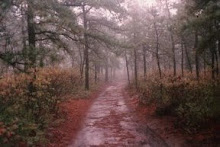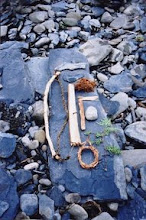 |
| Swamp Milkweed Fibers |
Earth Skills Seven Day Challenge: Day One
I started my natural fiber cordage project by making short cordage samples, complete with a flemish loop, to use as a teaching example. I started with Swamp Milkweed, which I have gathered last fall, and placed in a bundle in our barn/classroom rafters. I made a triple wrapped cord, using three strands of reversed wrap, and I used six plant stalks.
 |
| Completed Swamp Milkweed Cord |
 |
| Dogbane Cordage |
I went way over my time limit of 15-20 minutes, because my apprentices were making all kinds of good projects at the same time, such as atlatl darts, bone knife handles, and a throwing stick/sword combo (?) which was more of a carving experiment. We had a great time, and enjoyed hanging out and making stuff! It was a great, great time!
Earth Skills Seven Day Challenge Report: Day Two
Today's challenge was a continuation of cordage samples, for our educational programs. Today's plant fiber is Dogbane, and we collected it last January in the fields and roadsides near Hawk Circle, and stored it in our barn for our school programs and camps. It came out pretty great. I first peeled the fibers from the plant stalk's woody inner core, and then I buffed the fibers to remove the papery outer 'bark' to get the loosely bundled bare fibers. Then I twisted a loop and triple wrapped a nice cord.
 |
| Dogbane Fibers |
At this point, I am thinking of using swamp milkweed, common milkweed, dogbane, velvetleaf, nettles, basswood, elm and maybe some fireweed and a few other samples I have in my collection of fibers already. We will see how it goes!
Earth Skills Seven Day Challenge: Day Three
 |
| Milkweed stalks |
Today I continued with Common Milkweed. It went pretty smooth and I have literally made hundreds of feet of cordage with this plant fiber, and it's one of my favorites. Three down, and four more to go! I am going to make a display board for the cord too, so it should be pretty cool!
 |
| Milkweed Cord |
Anyway, the milkweed is thick, strong and a little silky, too, once the papery outer bark is worn away with washing or buffing. We had a thunderstorm earlier, so my picnic table was very wet, and when I laid my fibers on them while peeling them, the fibers got just wet enough that the papery bark didn't really flake off when I was buffing it. But it did twist very easily and it is tight and very round too.
Triple wrapped cord is awesome!
Earth Skills Seven Day Challenge Report: Day Four
 |
| Velvetleaf Fiber Cordage |
 |
| Velvetleaf fibers |
I found a small American elm sapling down by our pond, hidden amongst some willows, and I harvested (thankfully) a medium sized branch. I clipped off the leaves and the tiny branches, and gave them to the pigs, who went crazy for them, for some reason. I then began peeling the bark from the woody branch, and it peeled easily (it's the growing season, so bark comes off easily as there is a slimy layer of minerals and sap that is 'adding wood' to the tree). I peeled them off and then separated them into evenly sized strands, and then twisted them into a loop and length of cord. The final product still has some of the dark green bark on it, and it will shrink as it dries, leaving the final piece to be a little loose, but overall, it looks good. Tomorrow is either basswood or velvetleaf.
 |
| Elm Bark Cordage |
Earth Skills Seven Day Challenge: Day Five
Today, we had Carving Night, and a barn full of staff and apprentices making all kinds of things! I found a bundle of Velvet Leaf Stalks that grew in our garden one summer, really tall ones, almost six feet, and I peeled it and buffed it up, and then twisted it up. It's not as strong as milkweed or dogbane when it's older, but it is very serviceable, and it is tan and very coarse and uniform fiber that was easy to twist into cord.
I put my different cordage lengths together, too, and they are looking good. The display will be coming along soon. Probably Saturday! We will see how it looks! I need to take better photos in regular sunlight, because the halogen lights in the workshop turn everything a little orange/yellow!
 |
| Basswood Fibers in Layers |
Earth Skills Seven Day Challenge: Days Six and Seven Combined
 |
| Basswood Bark Fiber Cordage Loop |
I missed Day Six because I was working off-site most of the day and then had a date with Trista, so Day Seven was a combined effort of both days. I found some basswood fibers that had been pounded off of a log, and I buffed them up and then made some nice cordage with it. It is very rich and pungent smelling fibers, and it has a lot of dust in it that is very fine, too. It's a nice smell, very earthy and reminds me of sweet soil and goodness.
 |
| From the bottom: Swamp Milkweed, Common Milkweed Velvetleaf, Dogbane, Elm Bark and Basswood |
The fibers are fairly coarse and thick and it did require a good amount of strength in my fingers and hands to hold them tight while I wrapped them and twisted them. It's not a strong fiber, (the ones I was working with) but they would be serviceable, and make good matting, or maybe a thick basket handle woven around some saplings. Good stuff!
 |
| From the left: Milkweed/Dogbane Combo Rope, Yucca Leaf, Milkweed, White Cedar, Deer Sinew, Walnut, Basswood, Elm, Dogbane, Velvetleaf, Milkweed and Swamp Milkweed |
I also found some different cordage samples in my teaching basket, that I unravelled and then retested to have a loop and a triple wrap cord. I found some Northern White Cedar, some Walnut bark fiber, Yucca and even a sinew bow string from a long ago bow that I was working on... I added them to the set, along with a nice, very soft and silky milkweed cord, too. I even found a very thick, very strong milkweed/dogbane combo rope, that is a great way to demonstrate how these natural fibers would work on a large scale, for real weight and all that.
I didn't get my display finished in this challenge, but next time I will get it all set. I just put one of our timber framing pegs through the loops, and it still works great for now. I have to make some small identifying tags for each cord, so kids can guess each cord and see if they know what it is...
More pics to come of that, when I get it done!
If anyone wants to send me some Fireweed stalks, Nettle Fibers or Evening Primrose, please send me a message! I will trade for ten stalks of each!
Final Thoughts:
My chosen skill was picked by the group through a voting process, as I haven't had a chance to chose, (so many skills to pick!) and while I know cordage very well, it was nice to do something that will provide a teaching example for years to come.
I did work on my skills for about 40 minutes each time, so I went a little over the limit, but it was okay. I would love to spend all day on each skill, but hey, we gotta keep the classes going, right? It is really busy here with all kinds of planting, building projects, school groups, writing and other work that I am doing, so I am almost happy to take a few days off after this challenge and not feel the pressure of doing it and then posting it in the group, etc. But I will miss it after even a few days, so it won't last long!
Super proud of all the people who posted in the Facebook group Ricardo Sierra's Earth Skills Seven Day Challenge, and all the love you all showed each other, supporting, encouraging and connecting, I mean, it was just great to see what you all did and what you learned.
We did it, man, and it feels great! I hope that you all get out and celebrate these seven days, and all we accomplished! Woo hoo! Thanks for everything, Skill-Dogs! You are the best!













2 comments:
This is so awesome!! This is exactly what I was hoping to find. Nice explanations, photos and evetything!! I am defintely going to give it a try, gaveyou ever worked with sisal?
Yes, I have used Sisal, which is a coarse but very serviceable fiber.... It can be treated with anti-fungal stuff when it's used in baling twine and stuff like that, but we use it for a lot of lashing and crafts and stuff! Another fiber you can use is bear grass, or raffia, which twists very nicely and makes great cords! And you can twist and wrap all kinds of other fibers too.
Depending on where you are, there are usually at least a few different fiber sources around. You just have to find them! Sometimes I go to a museum with native people's crafts and see if I can find and identify the fibers they used in their art/crafts, if they are local, as the native peoples always used whatever they had available...
Thanks for your nice words, too! Much appreciated!
Post a Comment